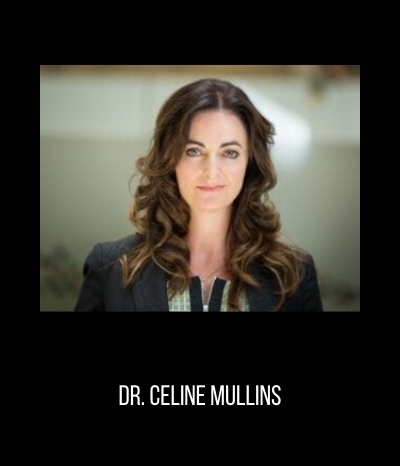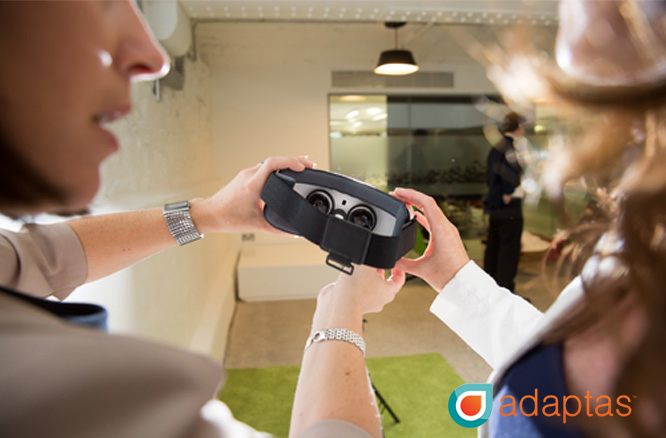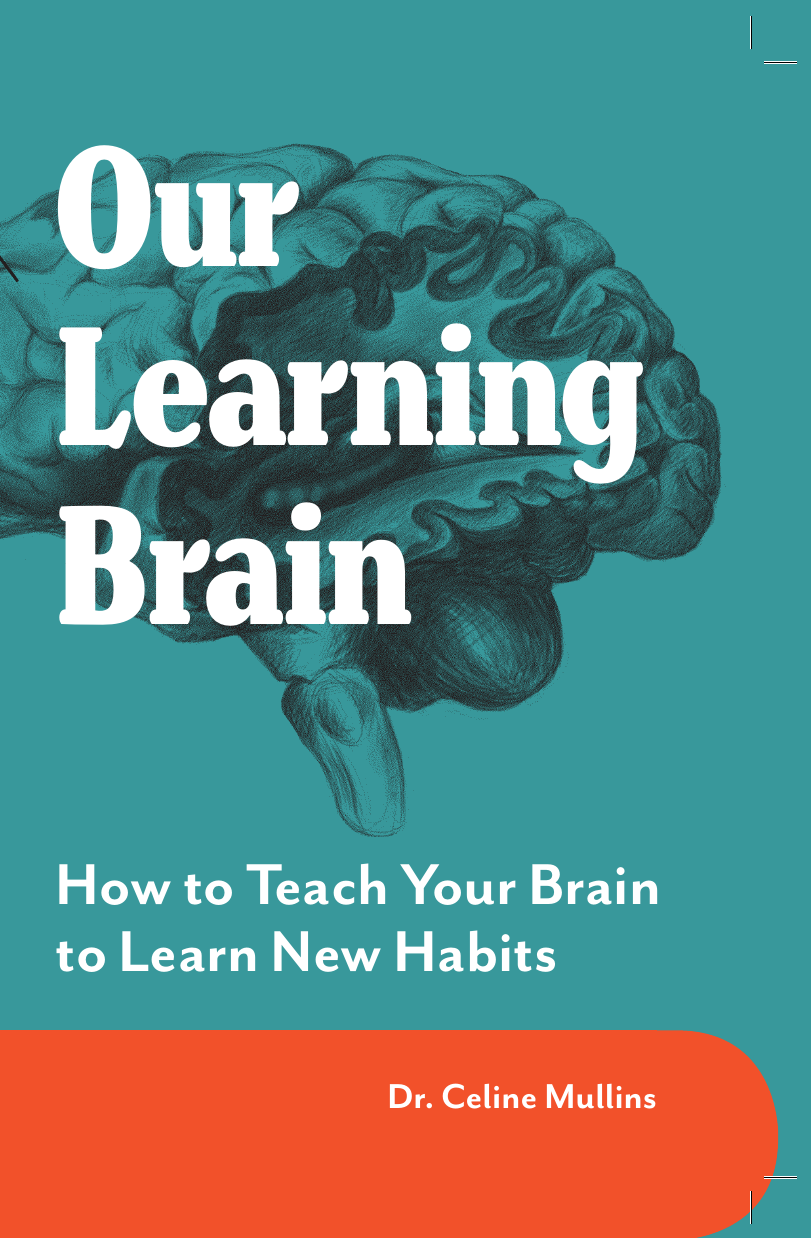Interview with Dr. Celine Mullins
Dr. Celine Mullins has over 15 years experience as a Psychologist, Coach and Training Consultant working across Multinationals, SME’s, Governmental and Educational agencies. Dr. Mullins is the CEO and Founder of Adaptas, a Leadership Development Training organisation, developing managers and leaders and teams, in Ireland and Internationally. She founded adaptas to put a gigantic spin on more traditional approaches to learning, which she believes often fall short of making real and lasting change happen.
With a focus on narrowing the gap between the training room and the real world, and using what we know about the brain and behaviour from psychology and neuroscience, Celine’s specialties include; leadership communication, eradicating behaviours and limiting beliefs that restrict performance and relationships, while improving team communication and collaboration.
Q & A
What led you to pursue a professional interest in business psychology?
I initially thought I wanted to be a clinical psychologist. But at the same time I wanted to be an actress and director! I always had a curiosity around business psychology, but it wasn't until soon after completing my PhD whilst I was working as a research psychologist, and also acting, that a conversation at a friends dinner party resulted in me going home and writing a business plan that lead me into business psychology. It soon became an obsession.
You've written and spoken widely about the fact that many problems in organizations are due to poor communication. In your experience, what is the major reason for poor workplace communication?
I would say that 70-80% of problems are caused by communication or lack thereof. We all make assumptions in our communication. We all think we are communicating in a way that everyone will understand. But often the people around us hear things differently to the way we meant it. Many of us are not listening to the people around us, and therefore we miss really great ideas and we also disempower others by not being present to them in our listening. All of us learnt to communicate from the people we grew up with; our friends, families and teachers. Very few of us had rolemodels who were excellent communicators and we do very little in school and college to get the basics of communication really working well for us.
In the workplace, when people attend development programmes which include a communication module or they work with a coach, it is often the first time they have really thought about their listening skills and how they are communicating. At this stage it's very challenging to break the communication habits that are in place.
In most cases, we will only change our communication habits if we believe it will benefit us personally. Changing communication habits are some of the toughest ones to change. It takes real commitment and often requires shattering some deeply held beliefs we are holding on to.
In addition to poor communication, as a psychologist working in organisations worldwide with individuals, groups and teams, what would you say are the most common issues you have to address?
At the moment, aside from communication, there are three main things we area helping people with:
1. Educating people on stress management and resilience skills. There is a lot of 'busyness' and expectation for us always to be on (digital communication etc).
2. Supporting individuals, teams and organisations to clarify and maintain the types of behaviours that enable that team and organisation to be a place where people want to be i.e culture. There are a lot of toxic organisations where blame and fear is rife.
3. Developing Emotional Intelligence. It may not appear to be the case sometimes, but many of the people who are rising to the top of organisations are those who not only communicate really well, but also understand their own emotions and can manage the emotions of other people.
Underlying all of this is helping people to really understand the psychology and neuroscience of how they can make habit change and embed it long-term.
You're renowned for employing new technologies such as Virtual Reality as part of your organisational learning and development work. What are the major benefits of these new technologies as far as employee training is concerned?
Going back to my passions in acting and directing, for many years we have written and produced training and educational videos for our clients. So in ways VR was a natural step for me as it brought together theatre, film and psychology - VR has been dubbed the empathy making machine. When my friend and colleague Camille Donegan called me up after experiencing her first 'hit' in VR, I knew we had found a way to create training experiences that were more true to life and immersive than many other approaches.
VR is when the viewers audio and visual senses are taken-over by a VR headset display and headphones. This enables the viewer to be transported anywhere, even into the perspective of another human being (known as embodiment).
Training and Learning is one of the best use cases for VR. When using VR headsets, the brain is tricked into thinking that the input being received by the visual and auditory senses is real. This is thought to be due to the spatial nature of the medium. The only other dimension where our brain has experienced 360 degree, 3-dimensional content before was in Real Reality (RR)! So, providing the content is created adhering to design principles to prevent motion sickness, and designed to make the viewer feel ‘present’ in this alternate reality, the brain believes the simulation to be real.
VR is being used for training in pretty much any sector or industry you can think of – healthcare, manufacturing, automotive, military, and of course corporate training. Since we started using VR at Adaptas, we have created VR training tools with the insurance industry, healthcare, and currently progressing tools in the legal sector.
One of the benefits of VR is consistency across all learners. And recently released research shows that training in VR is 40% faster than traditional training, which can result in a real and tangible cost savings for an organisation.
Compare the cost of a VR simulation and some headsets to the cost of video production, textbooks, and trainer/ facilitators and VR will be cheaper in the long run.
Our VR training tools for FBD Insurance was shortlisted for an IITD (Irish Institute for Training & Development) 'Excellence in Digital Learning' award in 2018 and again in 2019 when it WON the award. The judges commented that it was important that the tool was proven to be useful and sustainable for the organisation, which it had by year 2.
I'm excited to see what happens in Augmented reality (AR) in the coming years also. AR is when the viewer can still see the real world (their physical environment) but some extra information, such as video, imagery or audio is overlayed into that view. AR content is primarily experienced via mobile phones or tablets, but in the not too distant future, it will all happen via AR glasses. I believe AR is going to be a real winner for training as it becomes less glitchy in coming years.
What is neuroplasticity and why do you think it's so important in relation to adult learning?
Neuroplasticity is the ability of neurons to change their structure and relationships to one another in an experience-dependent manner according to environmental demands. This means that everything you think you know and feel now can change, depending on what you focus on. This capacity for learning and change is available to us throughout our entire lives.
As children, we learned by playing, making up stories, creating games together and actively using our imagination. This is how we best learn as adults; when learning is engaging, fun, and full of "imagining the possibilities". But as adults many of us stop imagining the possibilities, and are very stuck in our habits and our beliefs and biases, many of which are unconscious.
What can readers expect from your book 'Our Learning Brain'?
The idea with Our Learning Brain is that reading the book will help you to see learning from a new perspective and enable you to fully engage your brain for learning & habit Change
The feedback I have received to date is that the content is clear, accessible and covers salient points about habits and learning; that it is grounded in research and well laid out, while being easy to read. Readers from all types of backgrounds, from engineers, to therapists, psychologists and coaches, to auctioneers, (the list goes on) tell me that they are learning a lot, that there's good practical strategies in it, which they can implement quickly, and that it makes them look at things in a different way and raises questions and thoughts they hadn't considered. Many people are saying that it should be available in secondary school and for all adults in the workplace. Many of them agree that we are not acting on the learning science that is available to us, whether we are the teacher or the learner. And this book now makes this accessible.
If you had to pick just one defining characteristic of a great leader, what would it be?
Curiosity. If we can live from a place of curiosity we ask more questions, we live from a growth mindset and we can overcome obstacles easier. The best leaders I have met are naturally curious or they have worked on creating a more curious approach, with both themselves, the people around them and the challenges they face. This is why I have been writing another book, currently titled "The Ignited Leader', which help people to understand, explore and embed a mindset of curiosity.
What advice would you give to someone considering a career in workplace psychology?
Go for it. When you get to work with people, helping them to grow, with teams helping them to work together better and with organisations looking to change their ways, every day flies by. I get to the end of every day wondering where the day went. I can't imagine working in a role where I was clock-watching. If you are looking to get into the area just do it, even if it means interning for a few months. If you are waiting until you have a masters in organisational psychology, stop waiting. You'll learn so much by 'doing'.
What projects are you currently working on?
Ha! Where do I start. On my list this and coming weeks: VR training tool pre-production with a new insurance client; 2-D Video shoot with a healthcare client; design and start delivering a year-long programme for managers in a technology company; write a report on sales teams progress and development needs in a tech client; coaching client meetings; supervise 3 masters theses who are moving to completion; prepare an outline for a programme with a healthcare client; finalise workshop outline for managers with an insurance company client re. culture; deliver sessions with a law firm client; finish edits on Book 2 'Developing Learning Addicts' in the Maximising Brain Potential series and send to publisher; finish edits on 'The Ignited Leader' and send to publisher; Finish bringing the Maximising Brain Potential series online so that people can progress through the information and make real change from anywhere in the world. And thats all just a quarter of where my time is spent.
Connect With Dr. Celine Mullins
Visit Dr. Mullins' Company Website
Connect With Dr. Mullins on LinkedIn
know someone who would be interested in reading this interview? Share this page with them.
Go Back To The Psychology Expert Interviews Page





New! Comments
Have your say about what you just read! Leave me a comment in the box below.